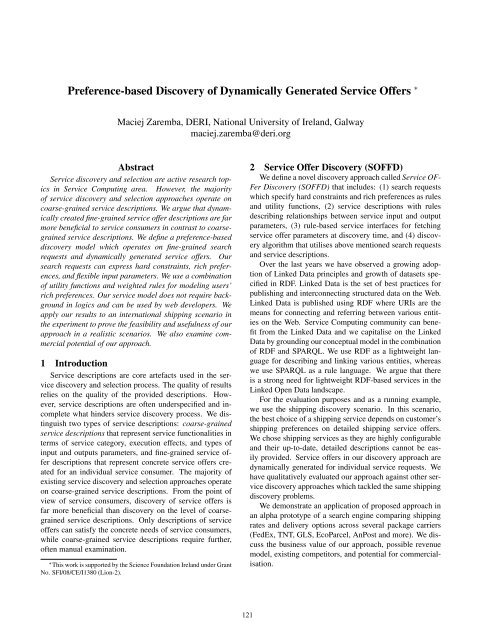NUI Galway – UL Alliance First Annual ENGINEERING AND - ARAN ...
NUI Galway – UL Alliance First Annual ENGINEERING AND - ARAN ...
NUI Galway – UL Alliance First Annual ENGINEERING AND - ARAN ...
You also want an ePaper? Increase the reach of your titles
YUMPU automatically turns print PDFs into web optimized ePapers that Google loves.
Preference-based Discovery of Dynamically Generated Service Offers ∗<br />
Maciej Zaremba, DERI, National University of Ireland, <strong>Galway</strong><br />
maciej.zaremba@deri.org<br />
Abstract<br />
Service discovery and selection are active research topics<br />
in Service Computing area. However, the majority<br />
of service discovery and selection approaches operate on<br />
coarse-grained service descriptions. We argue that dynamically<br />
created fine-grained service offer descriptions are far<br />
more beneficial to service consumers in contrast to coarsegrained<br />
service descriptions. We define a preference-based<br />
discovery model which operates on fine-grained search<br />
requests and dynamically generated service offers. Our<br />
search requests can express hard constraints, rich preferences,<br />
and flexible input parameters. We use a combination<br />
of utility functions and weighted rules for modeling users’<br />
rich preferences. Our service model does not require background<br />
in logics and can be used by web developers. We<br />
apply our results to an international shipping scenario in<br />
the experiment to prove the feasibility and usefulness of our<br />
approach in a realistic scenarios. We also examine commercial<br />
potential of our approach.<br />
1 Introduction<br />
Service descriptions are core artefacts used in the service<br />
discovery and selection process. The quality of results<br />
relies on the quality of the provided descriptions. However,<br />
service descriptions are often underspecified and incomplete<br />
what hinders service discovery process. We distinguish<br />
two types of service descriptions: coarse-grained<br />
service descriptions that represent service functionalities in<br />
terms of service category, execution effects, and types of<br />
input and outputs parameters, and fine-grained service offer<br />
descriptions that represent concrete service offers created<br />
for an individual service consumer. The majority of<br />
existing service discovery and selection approaches operate<br />
on coarse-grained service descriptions. From the point of<br />
view of service consumers, discovery of service offers is<br />
far more beneficial than discovery on the level of coarsegrained<br />
service descriptions. Only descriptions of service<br />
offers can satisfy the concrete needs of service consumers,<br />
while coarse-grained service descriptions require further,<br />
often manual examination.<br />
∗ This work is supported by the Science Foundation Ireland under Grant<br />
No. SFI/08/CE/I1380 (Lion-2).<br />
121<br />
2 Service Offer Discovery (SOFFD)<br />
We define a novel discovery approach called Service OF-<br />
Fer Discovery (SOFFD) that includes: (1) search requests<br />
which specify hard constraints and rich preferences as rules<br />
and utility functions, (2) service descriptions with rules<br />
describing relationships between service input and output<br />
parameters, (3) rule-based service interfaces for fetching<br />
service offer parameters at discovery time, and (4) discovery<br />
algorithm that utilises above mentioned search requests<br />
and service descriptions.<br />
Over the last years we have observed a growing adoption<br />
of Linked Data principles and growth of datasets specified<br />
in RDF. Linked Data is the set of best practices for<br />
publishing and interconnecting structured data on the Web.<br />
Linked Data is published using RDF where URIs are the<br />
means for connecting and referring between various entities<br />
on the Web. Service Computing community can benefit<br />
from the Linked Data and we capitalise on the Linked<br />
Data by grounding our conceptual model in the combination<br />
of RDF and SPARQL. We use RDF as a lightweight language<br />
for describing and linking various entities, whereas<br />
we use SPARQL as a rule language. We argue that there<br />
is a strong need for lightweight RDF-based services in the<br />
Linked Open Data landscape.<br />
For the evaluation purposes and as a running example,<br />
we use the shipping discovery scenario. In this scenario,<br />
the best choice of a shipping service depends on customer’s<br />
shipping preferences on detailed shipping service offers.<br />
We chose shipping services as they are highly configurable<br />
and their up-to-date, detailed descriptions cannot be easily<br />
provided. Service offers in our discovery approach are<br />
dynamically generated for individual service requests. We<br />
have qualitatively evaluated our approach against other service<br />
discovery approaches which tackled the same shipping<br />
discovery problems.<br />
We demonstrate an application of proposed approach in<br />
an alpha prototype of a search engine comparing shipping<br />
rates and delivery options across several package carriers<br />
(FedEx, TNT, GLS, EcoParcel, AnPost and more). We discuss<br />
the business value of our approach, possible revenue<br />
model, existing competitors, and potential for commercialisation.
















